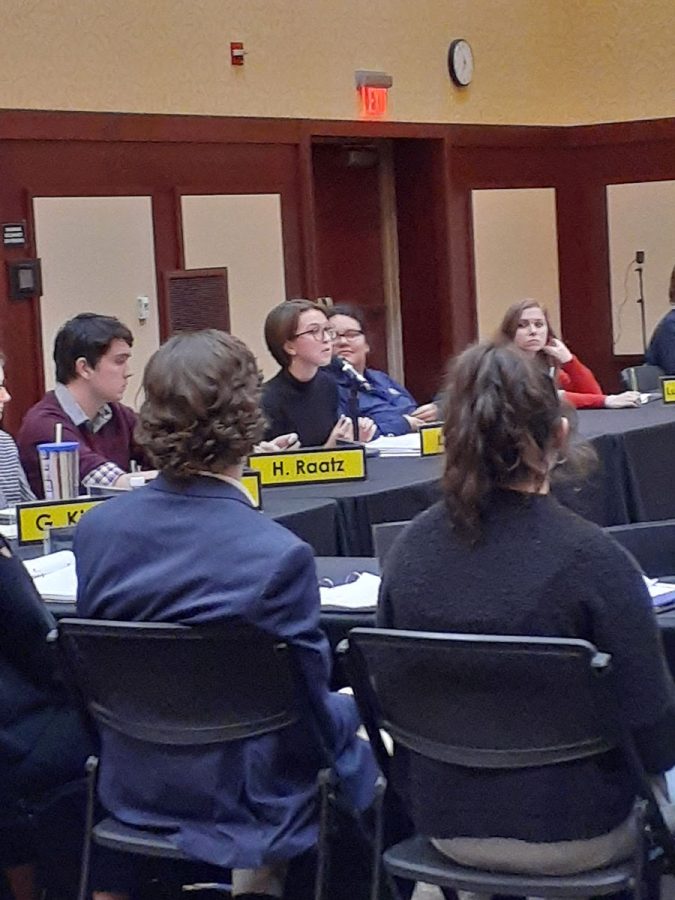Student Senate discusses LEED certification and enrollment plan
SOS seeks to ensure new science building will be third-party certified for sustainability
More stories from Taylor Hagmann
Photo by Taylor Hagmann
Lauren Becker, the director of the Student Office of Sustainability, answers questions about the third-party certification for the new science building
(Editor’s note: Sophia Spittlemeister is the Business Manager of The Spectator.)
Student Senate on Monday began with an open-forum speech by fifth-year student Lily Strehlow.
Lily Strehlow, an economics and sustainable liberal studies student and education intern for the Student Office of Sustainability, was one of the authors of a resolution to get a third-party certification for the new science building that will soon be built on campus. The resolution was discussed in an open-forum speech at the Student Senate meeting on Monday.
The certification would provide verification that the new building meets certain environmental qualifications.
“In this context, this means commissioning a credible, objective, outside source to provide insurance and legitimacy to a claim on the sustainability of the construction and workings of a building,” Lauren Becker, director of the SOS, said in a speech following Strehlow.
Two such options would be Leadership in Energy and Environmental Design (LEED) and WELL, both of which are certified by the Green Business Certification Incorporation.
In her speech, Becker said the certification is necessary to provide accountability in the construction and maintenance of the new building.
“58 percent of our campus carbon emissions are from heating, cooling and powering buildings on our campus,” Strehlow said. “To put that in perspective, that percentage needs to be zero in just over 30 years.”
Becker added that UW-Eau Claire has a goal of being carbon-neutral by 2050.
Although there is a cost associated with getting third-party certified, Becker said there are numerous reasons as to why UW-Eau Claire should seek certification. Among those reasons are energy-efficiency savings, being able to compete with other third-party certified UW campuses — such as UW-Oshkosh — and increasing prospective student enrollment.
“In our last poll of incoming first-year students, over 50 percent stated that sustainability impacted their decision to attend UWEC,” Becker said in her speech.
As for the building, Becker called it a “high-performance, energy-efficient, flagship building;” a “beacon of STEM and holistic public health;” with “faculty and prestigious health systems” and “collaborative research opportunities;” and the “view of the river or the Little Niagara from every angle.”
Before the vote, senators were given the opportunity to be on the speaker’s list and to speak out in support or opposition to the resolution. Trenton Phillippi, a third-year international business student and senator, spoke in support of the resolution but said the onus shouldn’t only be on students — the administration needs to do more to encourage sustainability.
“Since it falls on us, we should take action,” Phillippi said.
The resolution passed unanimously.
In addition to the third-party certification, Student Senate also discussed a resolution about whether or not to support discussions on Chancellor Schmidt’s Enrollment Plan, presented by Charlie Johnson — the president of Student Senate.
The Enrollment Plan involves $4.1 million used to increase enrollment in conjunction with Equity, Diversity and Inclusion, as well as the new sports Senate will be voting on to add in the next couple of years.
Part of the plan, Johnson said, is to increase the number of students of color by 20 percent.
During the speaker’s list, two senators expressed their dislike for the resolution.
Sophia Spittlemeister, a senator, said she saw the presentation Schmidt gave faculty before presenting to students, and EDI was not part of his original presentation.
She said his plan was to go to predominantly white schools, which have a small percentage of students of color, with the intent of enticing those students of color to enroll at UW-Eau Claire. Once those students of color boosted the percentage of diversity here, he said his plans were to then go to schools populated with larger percentages of students of color and encourage them to attend UW-Eau Claire once they see the diversity represented.
Spittlemeister said this was unfair due to different experiences by those students of color.
Senator Kayde Langer agreed. Langer said Schmidt is not trying to increase the number of diverse students of color but to find people of color who represent white culture more than their own.
Despite the dissent, the resolution passed 21-4-2.
As the last piece of business, three senators were appointed to be part of a committee which will meet once each semester with UW-Barron. Senators Becker, Travis DuChene and Grace Luloff will be meeting with representatives from UW-Barron to discuss issues such as shared governance as well as how to maintain a degree of independence between the sister universities, DuChene said.
Hagmann can be reached at hagmantc5161@uwec.edu.


